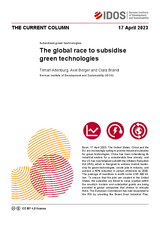Subsidised green technologies
The global race to subsidise green technologies
Altenburg, Tilman / Axel Berger/ Clara BrandiThe Current Column (2023)
Bonn: German Institute of Development and Sustainability (IDOS), The Current Column of 17 April 2023
Bonn, 17 April 2023. The United States, China and the EU are increasingly opting to provide industrial subsidies for green technologies. China has been subsidising its industrial sectors for a considerable time already, and the US has now followed suit with the Inflation Reduction Act (IRA), which is designed to achieve market leadership for green technologies, create jobs in industry, and achieve a 40% reduction in carbon emissions by 2030. The package of incentives is worth some USD 400 billion. To ensure that the jobs are created in the United States, the subsidies are linked to value creation within the country’s borders and substantial grants are being provided to global companies that choose to relocate there. The European Commission has now responded to the IRA by unveiling the Green Deal Industrial Plan, which includes provisions for relaxing EU subsidy regulations and establishing a new EU Sovereignty Fund to permit mass subsidisation of European industry.
At first glance, this is good news when it comes to global climate action. If competition between major industrialised nations over subsidies is focused on key green technologies, then this will accelerate the urgently needed development of clean technologies. Nonetheless, this approach has a number of disadvantages and could present an obstacle to a socially just, green transformation.
First, it brings about a redistribution of resources to companies, with taxpayers subsidising the private sector. A more beneficial approach would be 1) to use pricing mechanisms and regulation to motivate companies to internalise the environmental costs of their activities and 2) to promote research and innovation. Directly subsidising individual enterprises often creates a deadweight effect and encourages other countries to follow suit in providing subsidies, resulting in the inefficient use of scarce resources.
Second, increasingly generous subsidy programmes enable major corporations to attain an excessively strong negotiating position. If Europe “only” pays one third of the investment costs for a new industrial plant, then companies will tend to move to the United States, which offers to pay two thirds. This is the size of the subsidies being provided by the latter, for instance, in the case of the new plant for German chemical firm Evonik. The list of European companies (German only) now considering whether to build new plants in the United States instead of Europe is a long one, and includes VW, BMW and Siemens Energy.
Third, as the world’s strongest economies are paying massive subsidies, they are ejecting the rest of the world from the environmental technology market. If the United States establishes a programme of subsidies to catch up with China on the green industries front, then other countries will follow suit wherever possible. In Europe, it is mainly France and Germany who are able to counter US and Chinese subsidies, which could distort competition within the EU. The EU is seeking to gain exemptions from the United States’ protectionist measures for its own companies. Countries outside of the world’s three highly subsidised economic poles, namely the United States, China and the states of core Europe, will find it far harder to industrialise in innovative sectors such as green steel, electric vehicles, battery manufacture, and water electrolysis.
Fourth, competition between leading economic powers over subsidies undermines the rest of the rules-based trading system, which is supposed to guarantee equality. There is an urgent need to adjust the World Trade Organization (WTO)’s rules on subsidies to better position ourselves to tackle the climate crisis. However, this kind of reform is being hindered by the erosion of existing roles, for instance by the IRA. The WTO has become a paper tiger, and countries that fall by the wayside in the subsidy race barely have any remaining means of defending their interests in the face of the growing protectionism of the United States, China and the EU. The use of subsidies also undermines political acceptance of the EU’s planned Carbon Border Adjustment Mechanism (CBAM), which imposes duties on carbon-intensive imports from countries with no equivalent carbon pricing system. It is virtually impossible to convince other countries to accept new tariffs arguing for fairness in carbon pricing when the same economies that push for these tariffs distort competition through massive industrial subsidies.
What is the alternative? Ultimately, we need to see enormous acceleration in the development and market launch of environmental technologies to bring about a green transformation. A better approach than industrial subsidies would be to establish a combination of green taxes, regulatory requirements and innovation funding. The ecological restructuring of the tax system could see polluters charged more and fossil fuel subsidies reduced, channelling investment into climate-stabilising endeavours. Some of the additional revenue could be invested in social security, and some in research and development. Lower emissions thresholds would also encourage green investment without favouring major individual corporations.
Promoting green technologies is the shared responsibility of the international community and should enable all countries to transform their economies and benefit from fresh economic impetus. Consequently, it is important that industrialised nations fulfil their obligations under the Paris Agreement for the joint development and transfer of climate technology. They should, for instance, pay more into the Global Innovation Hub instead of subsidising industries at home.




